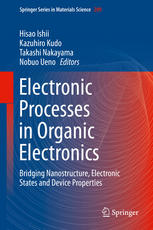

Most ebook files are in PDF format, so you can easily read them using various software such as Foxit Reader or directly on the Google Chrome browser.
Some ebook files are released by publishers in other formats such as .awz, .mobi, .epub, .fb2, etc. You may need to install specific software to read these formats on mobile/PC, such as Calibre.
Please read the tutorial at this link: https://ebookbell.com/faq
We offer FREE conversion to the popular formats you request; however, this may take some time. Therefore, right after payment, please email us, and we will try to provide the service as quickly as possible.
For some exceptional file formats or broken links (if any), please refrain from opening any disputes. Instead, email us first, and we will try to assist within a maximum of 6 hours.
EbookBell Team

4.8
14 reviewsThe book covers a variety of studies of organic semiconductors, from fundamental electronic states to device applications, including theoretical studies. Furthermore, innovative experimental techniques, e.g., ultrahigh sensitivity photoelectron spectroscopy, photoelectron yield spectroscopy, spin-resolved scanning tunneling microscopy (STM), and a material processing method with optical-vortex and polarization-vortex lasers, are introduced. As this book is intended to serve as a textbook for a graduate level course or as reference material for researchers in organic electronics and nanoscience from electronic states, fundamental science that is necessary to understand the research is described. It does not duplicate the books already written on organic electronics, but focuses mainly on electronic properties that arise from the nature of organic semiconductors (molecular solids). The new experimental methods introduced in this book are applicable to various materials (e.g., metals, inorganic and organic materials). Thus the book is also useful for experts working in physics, chemistry, and related engineering and industrial fields.